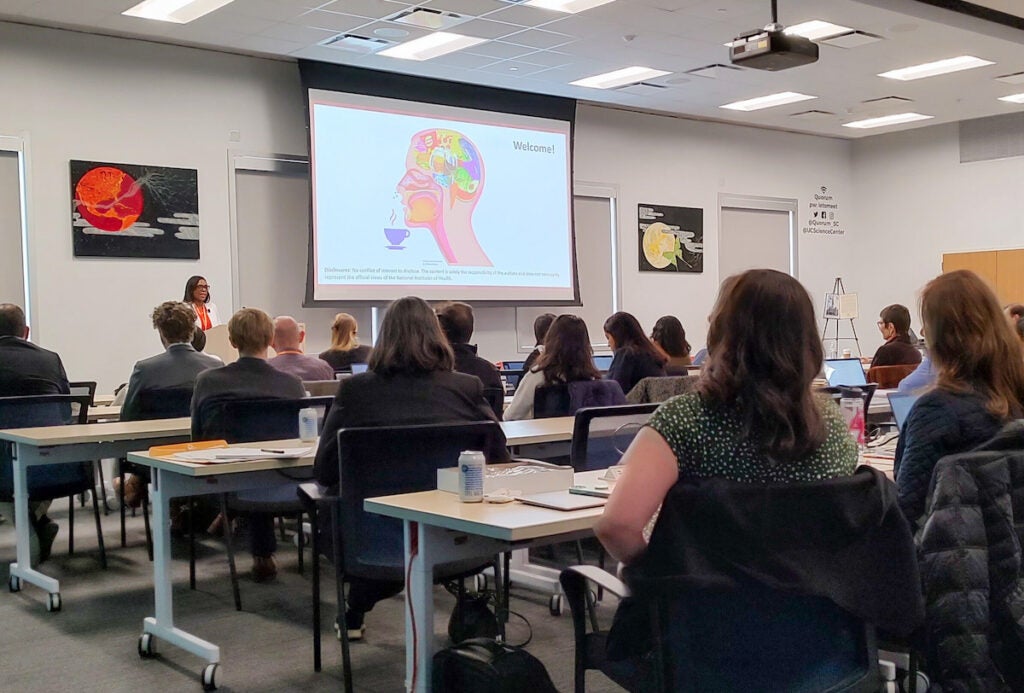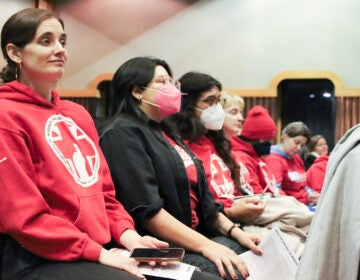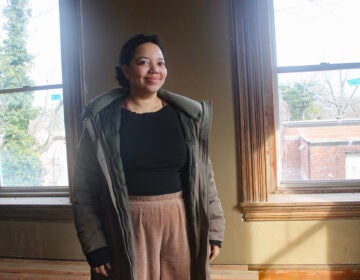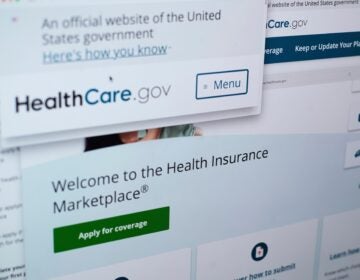Why don't doctors screen patients for smell loss? Researchers tell us why
Screenings are a big part of preventative health care, but getting the medical profession to accept a new screening into practice is challenging.
Listen 8:04
At Market Blooms in Reading Terminal Market Anndee Hochman attempts to smell the aromas of lilac and eucalyptus. (Emma Lee/WHYY)
This story is from The Pulse, a weekly health and science podcast.
Find it on Apple Podcasts, Spotify, or wherever you get your podcasts.
“Smell and taste testing for all.”
That was the slogan at the Towards Universal Chemosensory Testing Conference held in Philadelphia earlier this year. The National Institutes of Health funded conference created a space for researchers, physicians, and patients to discuss barriers preventing universal smell and taste screening.

A large portion of the conference was dedicated to smell loss — anosmia, hyposmia, and parosmia. Valentina Parma, a psychologist, and the assistant director of Monell Chemical Senses Center in Philadelphia has spent years researching how a patient’s quality of life is impacted by smell loss or a distortion of smell.
Patients can experience anxiety, depression, weight gain, or a loss of appetite. But what Parma wants people to understand even further is that smell loss could also be an early warning sign for debilitating diseases or illnesses.
“I’m thinking of a smell test more like a thermometer. A thermometer is used to detect if you have changes in temperature and if you have a fever,” Parma said. “You know that there is something wrong, but you don’t have a specific diagnostic label connected to it.”
Smell loss can be an early sign of diabetes, that you’ve experienced a severe concussion, Alzheimer’s disease, or Parkinson’s disease. Yet, catching these illnesses early can potentially prevent the severity. For example, people who are diagnosed with Parkinson’s disease report loss of smell up to 10 years before their diagnosis and before physical symptoms manifest.
Subscribe to The Pulse
But Richard Doty, the Smell and Taste Center director at the Perelman School of Medicine at The University of Pennsylvania, said catching smell loss when people don’t recognize it as a problem is a significant challenge.
“A number of studies in literature show that about a quarter of the people who have a smell problem, don’t know they have it until they’re tested,” Doty said. “For example, over 90% of people that have early-stage Parkinson’s disease have demonstrated smell loss, but only around 20 [to] 25 percent are aware of it.”
In addition to preventing disease progression, Doty argues that testing people’s sense of smell could prevent safety hazards.
“A person who has lost smell needs to be aware of spoiled food, dangerous environments, fire,” he said. “And indeed, a number of people die in accidental gas poisonings because they can’t smell, so there are reasons to know to be able to be aware of how much function you have.”
Barriers to smell loss screening
Parma said three barriers prevent routine smell testing: “Money, time, and awareness.”
Regarding time, Parma said incorporating smell tests into a doctor’s appointment is a challenge.
“When you talk to clinicians, primary care providers, even specialized clinicians, like here, nose and throat specialists, they don’t have the time to add extra tasks.”
Approved tests that measure the olfactory system can take up to 12 minutes to complete. But even if a doctor takes the time to administer the test, there is no real financial incentive to use it. In many cases, smell tests are not reimbursed by private health insurance or Medicare.
Jeb Justice, co-director at the University of Florida Clinic for Smell and Taste Disorders, said his center just pays for the test.
“It’s not like a hundred bucks a test,” said Justice, an ear, nose, and throat doctor. “I think the tests are like $40 a piece. But you know, it’s if you add up seeing hundreds of patients and hundreds of those tests over the course of the year. Then you know it adds up over time.”
The third hurdle to overcome, says Parma, is awareness.
Smell tends to be a neglected sense that some people consider less important until it’s compromised or gone. COVID-19 brought awareness to smell loss during the pandemic and how little health professionals know about the olfactory system. But still, experts like Doty, who have been in the field for decades, are not getting their hopes up yet.
“I think it’s going to be a long haul, frankly,” he said. “I think there’s a lot of enthusiasm, which is good, and enthusiasm drives interest, and the more that representatives of Congress or senators and others can be informed of the problems that are associated with these with disorders with smell and taste problems and that really needs to be reimbursement there needs to be interest.”
WHYY is your source for fact-based, in-depth journalism and information. As a nonprofit organization, we rely on financial support from readers like you. Please give today.







